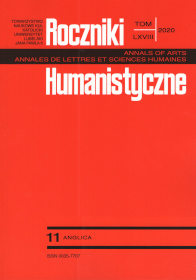Grieving Places, Sovereign Places: Storied Space in Louise Erdrich’s The Round House
Abstrakt
Przestrzenie żałoby, przestrzenie autonomii: przestrzeń opowieści w The Round House Louise Erdrich
Artykuł jest przyczynkiem do debaty na temat odrodzenia rdzennych Amerykanów w kontekście kolonialnego wywłaszczenia i wykorzenienia. Jest odpowiedzią na potrzebę wyjścia poza uproszczone reprezentacje rdzennych Amerykanów i ich ziemi. Sposobem na to może być uznanie powiązania pomiędzy tożsamością rozumianą jako bycie-w-ziemi a zakorzenioną normatywnością. Artykuł analizuje powieść The Round House (2012) autorstwa Louise Erdrich z plemienia Anishinaabe, koncentrując się na symbolice, opisach i tematyce powiązanych z ponownym opowiadaniem tożsamości i ziemi rdzennych Amerykanów. Te elementy czynią z powieści dekolonizujący palimpsest złożony z odrębnych, lecz misternie powiązanych warstw. Esej dowodzi, że powieść Erdrich za pomocą słów kreśli nową mapę Ameryki, na której jej rdzenni mieszkańcy odzyskują swą podmiotowość i prawo do żalu. Ponadto The Round House zauważa złożone powiązania pomiędzy rdzennymi Amerykanami a stylem życia kolonialnych najeźdźców i redefiniuje pojęcie suwerenności.
Bibliografia
Bauerkemper, Joseph. “Literary Realities: Trans/National Networks and Tribal Courts.” The Native American Literature Symposium, Isleta Resort & Casino, Albuquerque, NM, 19 Mar. 2016.
Bowers, Maggie Ann. “Literary Activism and Violence against Native North American Women.” Wasafiri, vol. 90, June 2017, pp. 48–53.
Brave Heart, Maria Yellow Horse, and Lemyra M. DeBruyn. “The American Indian Holocaust: Healing Historical Unresolved Grief.” American Indian and Alaska Native Mental Health Research, vol. 8, no. 2, 1998, pp. 56–78.
Breinig, Helmbrecht. “Transculturality and Transdifference: The Case of Native America.” Transatlantic Voices: Interpretations of Native North American Literatures, edited by Elvira Pulitano, U of Nebraska P, 2007, pp. 44–62.
Breinig, Helmbrecht, and Klaus Lösch. “Transdifference.” Journal for the Study of British Cultures, vol. 13, no. 2, 2006, pp. 105–22.
Buell, Lawrence. The Future of Environmental Criticism: Environmental Crisis and Literary Imagination, Blackwell, 2005.
Castor, Laura. “Louise Erdrich’s The Round House: Restorative Justice in a Coming of Age Thriller.” Nordlit, vol. 40, 2018, pp. 31–49.
Cooper Alarcón, Daniel. “The Aztec Palimpsest: Toward a New Understanding of Aztlán, Cultural Identity and History.” Aztlán: A Journal of Chicano Studies, vol. 19, no. 2, 1988–90, pp. 33–68.
Coulthard, Glen. Red Skins, White Masks: Rejecting the Colonial Politics of Recognition, U of Minnesota P, 2014.
Coulthard, Glen, and Leanne Betasamosake Simpson. “Grounded Normativity/Place-Based Solidarity.” American Quarterly, vol. 68, no. 2, 2016, pp. 249–55.
Deloria, Vine, Jr. God is Red: A Native View of Religion. Fulcrum, 1994.
Dillon, Sarah. The Palimpsest: Literature, Criticism, Theory. Bloomsbury, 2007.
Erdrich, Louise. LaRose. Corsair, 2016.
Erdrich, Louise. The Plague of Doves. HarperCollins, 2008.
Erdrich, Louise. The Round House. HarperCollins, 2012.
Foucault, Michel. “Nietzsche, Genealogy, History.” The Foucault Reader, edited by Paul Rabinow, Pantheon, 1984, pp.76–100.
Foucault, Michel. Power/Knowledge: Selected Interviews and Other Writings 1972–1977, edited by Colin Gordon, Longman, 1980.
Gross, Lawrence W. Anishinaabe Ways of Knowing and Being. Routledge, 2014.
Henry, Gordon. “Anishinaabeskinuk: Writing Over Skins, Writing Over Imagi (natives).” Wasafiri, vol. 90, June 2017, pp. 32–40.
Ibarrola-Armendariz, Aitor. “Negotiating Traumatic Memories in Louise Erdrich’s The Round House: White Man’s Law vs. Native Justice and Tradition.” Memory Frictions in Contemporary Literature, edited by María Jesús Martínez-Alfaro and Silvia Pellicer-Ortín, Palgrave Macmillan, 2017, pp. 255–76.
Johannessen, Lene M. “Palimpsest and Hybridity in Postcolonial Writing.” The Cambridge History of Postcolonial Literature, edited by Ato Quayson, vol. 2, Cambridge UP, 2012, pp. 869–902. DOI:10.1017/CHOL9781107007031.008.
Johnson, Kelli Lyon. “Writing Deeper Maps: Mapmaking, Local Indigenous Knowledges, and Literary Nationalism in Native Women’s Writing.” Studies in American Indian Literatures, vol. 19, no. 4, 2007, pp. 103–20.
Mar, Tracey Banivanua, and Penelope Edmonds. “Introduction: Making Space in Settler Colonies.” Making Settler Colonial Space: Perspectives on Race, Place and Identity, edited by Tracey Banivanua Mar and Penelope Edmonds, Palgrave Macmillan, 2010, pp. 1–24.
Martínez-Falquina, Silvia. “My Body Not My Own: An Intersectional View on Relationality in Fiction by Toni Morrison and Louise Erdrich.” Lectora: revista de dones i textualitat, vol. 26, 2020, pp. 117–32. DOI:10.1344/Lectora2020.26.8.
Moore, David. “The Ground of Memory: Vizenor, Land, Language.” Native American Survivance, Memory, and Futurity: The Gerald Vizenor Continuum, edited by Birgit Däwes and Alexandra Hauke, Routledge, 2017, pp. 90–101.
“Round.” Ojibwe People’s Dictionary, ojibwe.lib.umn.edu/search?utf8=%E2%9C%93&q=round& commit=Search&type=english. Accessed 30 Apr. 2020.
Owens, Louis. Mixedblood Messages: Literature, Film, Family, Place. U of Oklahoma P, 2001.
Simpson, Leanne Betasamosake. As We Have Always Done: Indigenous Freedom through Radical Resistance. U of Minnesota P, 2017.
Sinclair, Niigaanwewidam James, and Warren Cariou, editors. Introduction. Manitowapow: Aboriginal Writings from the Land of Water, Highwater, 2011, pp. 1–12.
Tharp, Julie. “Erdrich’s Crusade: Sexual Violence in The Round House.” Studies in American Indian Literatures, vol. 26, no. 3, 2014, pp. 25–40.
Wilson, Shawn. Research Is Ceremony: Indigenous Research Methods. Fernwood, 2008.
Copyright (c) 2020 Roczniki Humanistyczne

Utwór dostępny jest na licencji Creative Commons Uznanie autorstwa – Użycie niekomercyjne – Bez utworów zależnych 4.0 Międzynarodowe.





